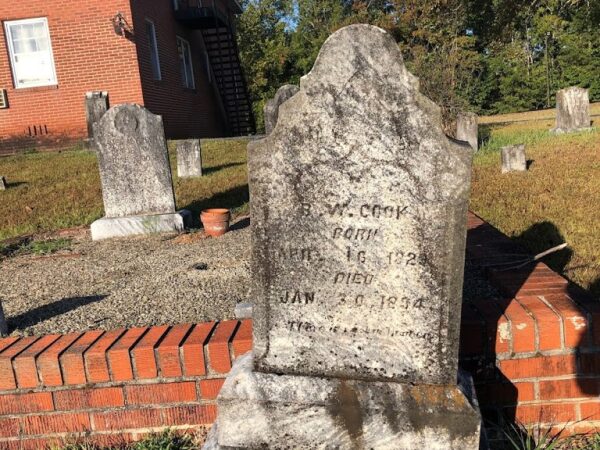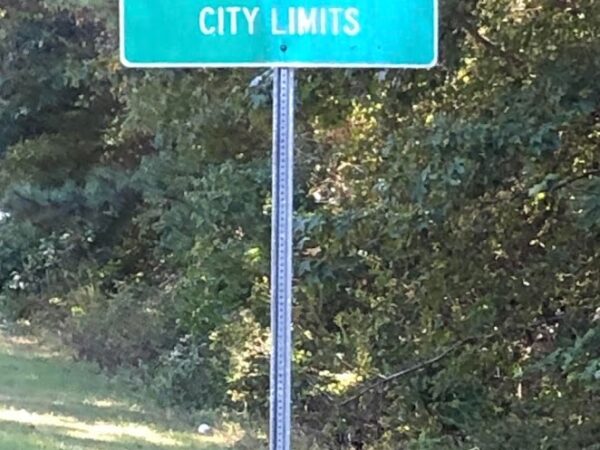 “John M. had a brother Jim that went to Alabama.” This simple sentence was scribbled on the corner of a small piece of faded paper and barely legible. The paper was among a meager collection of a handful of papers and pedigree charts that had belonged to my Grandma and Grandpa Ganus. When I first received the little floral fabric suitcase, I had had such high hopes that it would be filled with the kind of information that every genealogist dreams of receiving- a family bible, letters rich in genealogical detail and pictures. At first glance the suitcase appeared to hold just a few pedigrees with names, dates and information which I already had and void of any documentation. Upon closer examination, however, I found that among the pedigrees sheets were a few choice pieces of papers with handwritten notes that would provide me with some much needed clues.
“John M. had a brother Jim that went to Alabama.” This simple sentence was scribbled on the corner of a small piece of faded paper and barely legible. The paper was among a meager collection of a handful of papers and pedigree charts that had belonged to my Grandma and Grandpa Ganus. When I first received the little floral fabric suitcase, I had had such high hopes that it would be filled with the kind of information that every genealogist dreams of receiving- a family bible, letters rich in genealogical detail and pictures. At first glance the suitcase appeared to hold just a few pedigrees with names, dates and information which I already had and void of any documentation. Upon closer examination, however, I found that among the pedigrees sheets were a few choice pieces of papers with handwritten notes that would provide me with some much needed clues.
Grandma had researched in a day without computers and the endless online databases, forums and mailing lists so readily available today. She was limited by her inability to travel to a distant research facility and the long wait associated with snail mail. I feel so fortunate to have ready access to so much online data in addition to being close to an excellent research library. But Grandma had something I don’t have—she had people around her that remembered, people that knew the people who are now just names on a pedigree for me. How I wish I would have been interested in family history when Grandma was alive and that I had tapped into her knowledge. But I was young and busy and my mind and interests were elsewhere. So I will just be grateful that she took the time to scribble a few notes that I would eventually find and treasure.
My father had no knowledge of Jim, who was John’s brother and who had gone to Alabama. In fact, my family knew very little about John, my own great great grandfather because my grandfather had been orphaned at 8 years of age. So we were left to piece together what we could and to do our best to learn from what others had recorded, which brings me back to the faded paper and the scribbled note about Jim. Just who was Jim?
Turning to the 1850 census, I could see that my third great grandparents, James and Betsy Ganus did have a son named James. Their oldest son, my second great grandfather, John was 22 at the time, but James, a much younger brother was only 11. In between John and James were brothers David, who was 16 and Jackson (William Jackson) who was 12, along with sisters Margaret and Rebecca, and then some additional younger siblings, so I find it interesting that James, or “Jim” was the only sibling named on that paper.
Jim’s formal name was James W. and he was born Nov 1841, likely in Fayetteville, Georgia. On the 31st of August in 1862, at the age of 21, James enlisted in the Confederate Army and served with the 44th Georgia Regiment. From James’ Civil War discharge certificate we learn that he was six feet tall, had a fair complexion, blue eyes and light hair. I love knowing what he looked like.
 |
| Battle of Sharpsburg fought September 17, 1862 near Sharpsburg, Maryland Picture by Kurz & Allison |
I wonder how James’ parents felt when they learned that he had been shot in the right arm at The Battle of Sharpsburg, which was known as the bloodiest single-day battle of the Civil War. James was treated and remained with his regiment until he was discharged on July 3, 1863. I also wonder if James realized how fortunate he was to have survived a gunshot wound during a time when the medicine practiced was relatively primitive and when so many died of infection. His record did indicate that at his release he was partially blind due to sickness contracted while in the service. It went on to state that at that time that James was
“so blind he cannot see to read or distinguish one person from another at ten paces. Is unfit for duty in any depart. of government.”
My heart goes out to him, knowing that he was so blind he was considered unfit for duty and yet he would return home and would need to provide for himself and his family for the rest of his life.
 |
| Tallapoosa, Haralson County 1890 From Vanishing Georgia used with permission |
In about 1865 James married Frances Foster. They lived in Haralson County and had two children, James C. and Minnie Elizabeth. Early in my research, descendants of James C. shared with me a story that had been passed down. According to the story, James’ wife Frances had died in childbirth and so James had taken that child, a daughter named Minnie, to her maternal grandmother to raise and then he had taken his son James C. with him and headed to Alabama. While evidence suggests that Frances did die and that Minnie was raised by her grandmother and that James C. remained with his father, James W. actually did not go to Alabama until nearly 30 years later. (I will tell Minnie’s story at a later time.) In about 1875, James W. married Nancy E. Ayers in Haralson County, Georgia. No children were ever born to this union. On January 5th, 1897, Nancy died and was buried in the Fairview West Missionary Baptist Church Cemetery in Cullman, Alabama. In 1897, James once again married, this time to Martha Henriettta Watterson Basinger, a widow.
February 10, 1899, James applied for relief as a confederate soldier, indicating that he was incapable of making a living by manual labor because of partial blindness and Bright’s Disease. At that time he was 58 and living at Johnson’s Crossing in Cullman County, Alabama. The County board indicated that they felt satisfied to the truth of his application and his pension was approved.
On March 18, 1911, James W. or “Jim” as John called him, passed from this life. According to his death certificate, he was buried in Fairview West Missionary Baptist Church cemetery although no headstone has been found.
My journey in learning about James all began with the simple words, “John M. had a brother Jim that went to Alabama.” Once again I am grateful for those that took the time to record what they knew, no matter how seemingly insignificant. It makes me ask myself, what clues am I leaving for the next generation?
Copyright © Michelle G. Taggart 2012




Michelle, it is wonderful to find so many facts and stories from such seemingly insignificant details. However, that tells me one more thing: as we develop this knack, and absorb all the stories we've discovered along the way, we are storing up a body of knowledge that is itself specialized. What others now see as "just a slip of paper" and might tend to trash when disposing of departed loved ones' belongings, we can extract all sorts of amazing data from.
I'll never forget that still-small-voice feeling to grab that "trash pile" after all the relatives went through one set of belongings. By heeding that inner voice, I was able to retrieve some valuable information.
Because we've gained this knowledge, we can add value to our family members–both near and distant–in advising them of the value of the "stuff" they are thinking about throwing away.
I hate to think of all the hints of family history that have been tossed, all because no one understood the significance of one small sentence jotted on the corner of some scrap paper.
Michelle, this is a haunting story from the outset, with the phrase, "a brother Jim that went to Alabama." James W. did go to Alabama, but a lot of life events happened to him both before and afterward. Simply amazing that he could have lived, and interacted with so many family members, for almost half a century after being so disabled by his service in the Confederate Army. (I had been guessing Antietam was the bloodiest battle. Forgot about Sharpsburg.)
My family comes from South Carolina, and I see several similarities besides service in the Confederacy. I see "that" used as a relative pronoun instead of "who," unlike in the North ("a brother Jim that . . .). I see the tendency to identify/tag a person's whole life with a phrase. Our family used to speak of "Oliver who was the lawyer in Texas" or "William the preacher who moved his family to Alabama" or "Gussie who got on the train with her husband to Florida." Shorthand for days without computers. I also feel a Stoicism through hard times . . . people weren't supposed to "dwell on" their troubles — and Jim had plenty.
A hard-bitten tale, that sounds familiar to me! Thanks for this post!
That's an interesting thought Jacqi and I hadn't quite looked at it that way, but it's so true. I guess it goes along with what is one person's trash is another person's treasure and that is in part because of what we see as a result of what we know. Thanks so much for your comments. (and yes, it makes my stomach hurt to think of all the treasures that have been tossed because their value wasn't readily apparent!)
Very interesting observations Mariann. Another example that the more we know the more that we see. I didn't realize the difference in the usage of "that" vs "who". I will certainly be on the look out for more of those types of things.
I does appear to me (and maybe just because we don't have as much access to their thoughts and feelings) that people of an earlier era not ony did not dwell on their troubles, but seemed to accept them more as a part of life. I have often wondered if our access to so many things that make life easier has caused us to expect life to be trouble free. I love people's comments on this blog as it makes me think deeper and helps me see things I didn't see before.
I can identify with two comments you made, Michelle. First, how you wished you'd been interested in family history when your grandmother was alive. Me, too! My grandmother had some interesting ancestors, especially her father and grandfather. Even if I hadn't asked questions, I wish family stories had been told. And so we're left to find out things on our own. What a blessing to find bits of information in your suitcase.
Second, you said you love knowing a physical description of an ancestor. Me, too! I was so excited to get a Civil War pension file and learn my g-g-grandfather's hair and eye color and his weight. I always know I'm searching for a person, and not just names and dates, but knowing a little about their physicality/personality/any anecdotal information brings them to life as individuals.
And as for the "who" vs. "that" idea. I don't know about decades ago but these days I think which word is use is based more on the education of the speaker than anything else. I'm from the North and I more frequently hear people use "that" than "who." (I'm sorry to say I always mentally correct it to "who.")
I'm glad you found Jim.